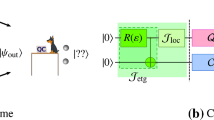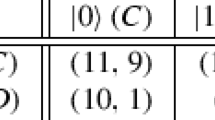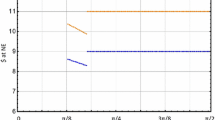Abstract
In this work, we introduce a quantum analogue of two-player Traveler’s dilemma game. Traveler’s dilemma is an entirely new type of game in comparison to Prisoner’s dilemma because of the role of backward induction chain. The game presents a unique challenge as we strive to reduce this classical game to a quantum game without compromising its integrity and complexity. In classical TD with a strict game-theoretical approach, backward induction causes descent to a Nash equilibrium with the worst payoff. Interestingly, experiments have shown that individuals and groups choose strategies that demonstrably provide much higher payoffs than what the pure classical analysis predicts. We have shown in this paper that with the quantum model, the payoffs are Pareto-optimal at the Nash equilibrium with maximally entangled particles. As the entanglement is made non-maximal, it is observed that the quantum strategies do not always produce the Pareto-optimal Nash equilibrium at all values of the entanglement parameter \(\gamma \). We observe phase transition like behavior for the Nash equilibria. The behavior of the TD game with a generalized payoff matrix and the effect of the entanglement parameter are analyzed in detail in this work. The relation between the Eisert–Wilkens–Lewenstein entangler parameter \(\gamma \) and the von Neumann entropy S of the resultant state is analyzed. As can be anticipated in an actual experiment, entanglement may not always be maximal and therefore it becomes important to know the value of the parameter \(\gamma \) before the players finalize a strategy. We show that the Traveler’s dilemma is completely resolved in the quantum model.








Similar content being viewed by others
Data availability
All data generated or analyzed during this study are included in this article.
References
Fréchet, M.: Commentary on the three notes of emile borel. Econom. J. Econom. Soc. 118–124 (1953)
Von Neumann, J., Morgenstern, O.: Theory of games and economic behavior. In: Theory of Games and Economic Behavior, Princeton University Press (2007)
Morgenstern, O.: The collaboration between oskar morgenstern and john von neumann on the theory of games. J. Econ. Lit. 14(3), 805–816 (1976)
Deutsch, D.E.: Quantum computational networks. Proc. R. Soc. Lond. A. Math. Phys. Sci. 425(1868), 73–90 (1989)
Gisin, N., Ribordy, G., Tittel, W., Zbinden, H.: Quantum cryptography. Rev. Mod. Phys. 74(1), 145 (2002)
Hayward, M.: Quantum Computing and Shor’s Algorithm. Macquarie University Mathematics Department, Sydney (2008)
Grover L.K.: A fast quantum mechanical algorithm for database search. In: Proceedings of the Twenty-Eighth Annual ACM Symposium on Theory of Computing, pp. 212–219 (1996)
Meyer David, A.: Quantum strategies. Phys. Rev. Lett. 82(5), 1052 (1999)
Eisert, J., Wilkens, M., Lewenstein, M.: Quantum games and quantum strategies. Phys. Rev. Lett. 83(15), 3077 (1999)
Eisert, J., Wilkens, M.: Quantum games. J. Mod. Opt. 47(14–15), 2543–2556 (2000)
Ramzan, M., Nawaz, A., Toor, A.H., Khan, M.K.: The effect of quantum memory on quantum games. J. Phys. A: Math. Theor. 41(5), 055307 (2008)
Ichikawa, T., Tsutsui, I., Cheon, T.: Quantum game theory based on the schmidt decomposition. J. Phys. A: Math. Theor. 41(13), 135303 (2008)
Guo, H., Zhang, J., Koehler, G.J.: A survey of quantum games. Decis. Supp. Syst. 46(1), 318–332 (2008)
Benjamin, S.C., Hayden, P.M.: Multiplayer quantum games. Phys. Rev. A 64(3), 030301 (2001)
Flitney, A.P., Abbott, D.: Quantum version of the monty hall problem. Phys. Rev. A 65(6), 062318 (2002)
Flitney, A.P., Ng, J., Abbott, D.: Quantum parrondo’s games. Physica A 314(1–4), 35–42 (2002)
Lai, J.W., Cheong, K.H.: Parrondo’s paradox from classical to quantum: a review. Nonlinear Dyn. 100(1), 849–861 (2020)
Lai, J.W., Cheong, K.H.: Parrondo effect in quantum coin-toss simulations. Phys. Rev. E 101(5), 052212 (2020)
Li, Q., Iqbal, A., Chen, M., Abbott, D.: Evolution of quantum strategies on a small-world network. Eur. Phys. J. B 85, 1–9 (2012)
Li, Q., Iqbal, A., Chen, M., Abbott, D.: Evolution of quantum and classical strategies on networks by group interactions. New J. Phys. 14(10), 103034 (2012)
Li, Q., Iqbal, A., Perc, M., Chen, M., Abbott, D.: Coevolution of quantum and classical strategies on evolving random networks. PLoS ONE 8(7), e68423 (2013)
Li, Q., Chen, M., Perc, M., Iqbal, A., Abbott, D.: Effects of adaptive degrees of trust on coevolution of quantum strategies on scale-free network. Sci. Rep. 3(2949), 10 (2013)
Phoenix, S., Khan, F., Teklu, B.: Preferences in quantum games. Phys. Lett. A 384(15), 126299 (2020)
Teklu, B., Genoni, M., Olivares, S., Paris, M.: Phase estimation in the presence of phase diffusion: the qubit case. Phys. Scr. 014062(09), 2010 (2010)
Brivio, D., Cialdi, S., Vezzoli, S., Teklu, B., Genoni, M., Olivares, S., Paris, M.: Experimental estimation of one-parameter qubit gates in the presence of phase diffusion. Phys. Rev. A 81, 10 (2009)
Teklu, B., Olivares, S., Paris, M.: Bayesian estimation of one-parameter qubit gates. J. Phys. B: At. Mol. Opt. Phys. 42, 12 (2008)
Basu, K.: The traveler’s dilemma: paradoxes of rationality in game theory. Am. Econ. Review 84(391–95), 02 (1994)
Basu, K.: The traveler’s dilemma. Sci. Am. 296(90–5), 07 (2007)
Flitney, A.P., Abbott, D.: An introduction to quantum game theory. Fluct. Noise Lett. 2(04), R175–R187 (2002)
Avishai, Y.: Some topics in quantum games. Preprint arXiv:1306.0284 (2013)
Bordg, A., He, Y.: Comment on“ quantum games and quantum strategies”. Preprint arXiv:1911.09354 (2019)
Monica Capra, C., Goeree, J.K., Gomez, R., Holt, C.A.: Anomalous behavior in a traveler’s dilemma? Am. Econ. Review 89(3), 678–690 (1999)
KUDOSE SATORU: Traveler’s dilemma. math.uchicago.edu (2007)
Jiangfeng, D., Xiaodong, X., Li, H., Zhou, X., Han, R.: Entanglement playing a dominating role in quantum games. Phys. Lett. A 289(1–2), 9–15 (2001)
Jiangfeng, D., Xiaodong, X., Li, H., Zhou, X., Han, R.: Playing prisoner’s dilemma with quantum rules. Fluct. Noise Lett. 2(04), R189–R203 (2002)
Jiangfeng, D., Li, H., Xiaodong, X., Zhou, X., Han, R.: Phase-transition-like behaviour of quantum games. J. Phys. A: Math. Gen. 36(23), 6551 (2003)
Jiangfeng, D., Li, H., Xiaodong, X., Shi, M., Jihui, W., Zhou, X., Han, R.: Experimental realization of quantum games on a quantum computer. Phys. Rev. Lett. 88(13), 137902 (2002)
Elgazzar, A.S.: Unique solution to the quantum prisoner’s dilemma game. J. Phys. Soc. Jpn. 88(3), 034801 (2019)
Jozsa, R., Schlienz, J.: Distinguishability of states and von neumann entropy. Phys. Rev. A 62(1), 012301 (2000)
Linden, N., Winter, A.: A new inequality for the von neumann entropy. Commun. Math. Phys. 259, 129–138 (2005)
Hidalgo, E.G.: Quantum games entropy. Physica A 383(2), 797–804 (2007)
Rezakhani, A.T.: Characterization of two-qubit perfect entanglers. Phys. Rev. A 70(5), 052313 (2004)
Shen, Y., Chen, L.: Entangling power of two-qubit unitary operations. J. Phys. A: Math. Theor. 51(39), 395303 (2018)
Zhang, J., Vala, J., Sastry, S., Whaley, K.B.: Geometric theory of nonlocal two-qubit operations. Phys. Review A 67(4), 042313 (2003)
Acknowledgements
One of the authors Hoor Banu thanks PES University for the fellowship for the PhD course.
Author information
Authors and Affiliations
Corresponding author
Ethics declarations
Conflict of interest
The authors have no conflict of interest to declare.
Additional information
Publisher's Note
Springer Nature remains neutral with regard to jurisdictional claims in published maps and institutional affiliations.
Supplementary Information
Below is the link to the electronic supplementary material.
Rights and permissions
Springer Nature or its licensor (e.g. a society or other partner) holds exclusive rights to this article under a publishing agreement with the author(s) or other rightsholder(s); author self-archiving of the accepted manuscript version of this article is solely governed by the terms of such publishing agreement and applicable law.
About this article
Cite this article
Banu, H., Rao, K.R. Quantum Traveler’s dilemma and the role of non-maximal entanglement. Quantum Inf Process 22, 252 (2023). https://doi.org/10.1007/s11128-023-04016-y
Received:
Accepted:
Published:
DOI: https://doi.org/10.1007/s11128-023-04016-y




